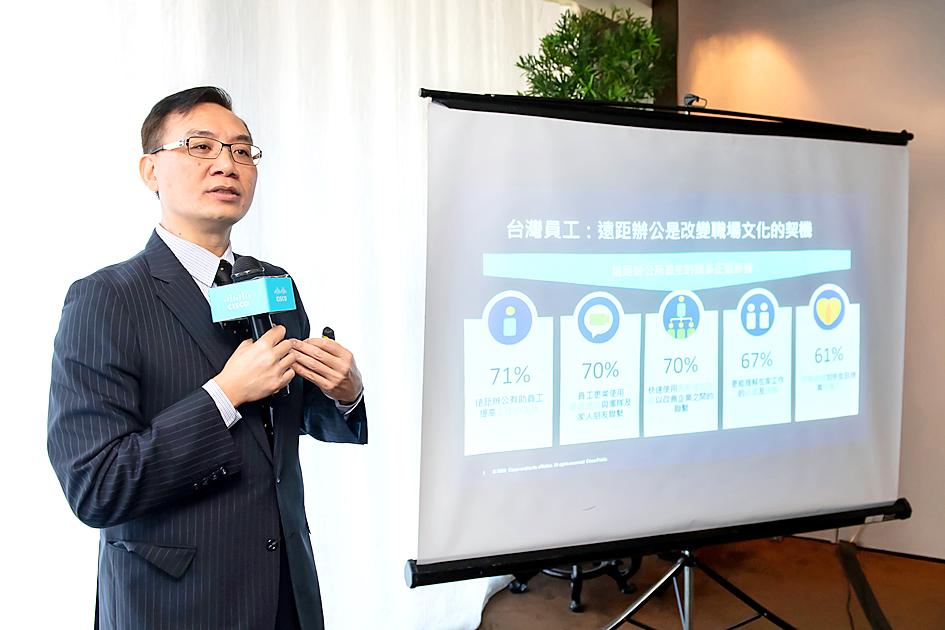Cisco Systems Inc is next month to open a software development center in New Taipei City’s Linkou District (林口), the first of its kind for the US firm in the Asia-Pacific Region, the company said on Wednesday.
The center is to be inaugurated after the Lunar New Year holiday, which ends on Feb. 16, Cisco vice president of greater China operations George Chen (陳志惟), who is also head of Cisco Systems Taiwan Ltd (台灣思科系統), told a news conference in Taipei.
The US information technology (IT), networking and cybersecurity solutions provider also released a workforce report at the news conference.

Photo courtesy of Cisco Systems Inc
Cisco Taiwan chief technology officer Robert Feng (馮志良) told reporters that the center would house tech start-ups from across the nation.
With the assistance of Cisco’s presence, these firms are expected to speed up their product development, he added.
In the initial stage, the center would focus on rolling out information security solutions, by combining the resources of Cisco and the start-ups, Feng said.
In the long term, Cisco would work with these companies to put out new applications in the global market, he said.
Cisco already operates similar centers in the US and Europe.
Meanwhile, Chen said that when he assumed the role of head of Cisco Taiwan three years ago, the company had about 60 employees, but now has more than 100, focusing on a wide range of areas, such as information security, IT services and 5G networking.
Citing the workforce report, Chen said that last year presented a challenge to enterprises in Taiwan and their employees amid the COVID-19 pandemic, which led the company to have employees work from home.
Despite the adjustment to curtail infections, many employees said they had a positive experience working remotely, as they found they were able to work more efficiently, he said.
The workforce report showed that 49 percent of the employees polled said they felt more energized working from home, 39 percent said they felt healthier and 37 percent said they were happier.
The report showed that before the pandemic, only 7 percent of employees in Taiwan worked remotely.
Since the pandemic, 71 percent of them said that online work has boosted their independence, 71 percent said they used teleconferencing more often than before and 70 percent agreed that communication could be improved through new technology.
The report analyzed data collected from more than 14,000 employees in 14 markets in the Asia-Pacific region, with remote working the focus of the questions, Cisco said.

TAKING STOCK: A Taiwanese cookware firm in Vietnam urged customers to assess inventory or place orders early so shipments can reach the US while tariffs are paused Taiwanese businesses in Vietnam are exploring alternatives after the White House imposed a 46 percent import duty on Vietnamese goods, following US President Donald Trump’s announcement of “reciprocal” tariffs on the US’ trading partners. Lo Shih-liang (羅世良), chairman of Brico Industry Co (裕茂工業), a Taiwanese company that manufactures cast iron cookware and stove components in Vietnam, said that more than 40 percent of his business was tied to the US market, describing the constant US policy shifts as an emotional roller coaster. “I work during the day and stay up all night watching the news. I’ve been following US news until 3am

UNCERTAINTY: Innolux activated a stringent supply chain management mechanism, as it did during the COVID-19 pandemic, to ensure optimal inventory levels for customers Flat-panel display makers AUO Corp (友達) and Innolux Corp (群創) yesterday said that about 12 to 20 percent of their display business is at risk of potential US tariffs and that they would relocate production or shipment destinations to mitigate the levies’ effects. US tariffs would have a direct impact of US$200 million on AUO’s revenue, company chairman Paul Peng (彭雙浪) told reporters on the sidelines of the Touch Taiwan trade show in Taipei yesterday. That would make up about 12 percent of the company’s overall revenue. To cope with the tariff uncertainty, AUO plans to allocate its production to manufacturing facilities in

Six years ago, LVMH’s billionaire CEO Bernard Arnault and US President Donald Trump cut the blue ribbon on a factory in rural Texas that would make designer handbags for Louis Vuitton, one of the world’s best-known luxury brands. However, since the high-profile opening, the factory has faced a host of problems limiting production, 11 former Louis Vuitton employees said. The site has consistently ranked among the worst-performing for Louis Vuitton globally, “significantly” underperforming other facilities, said three former Louis Vuitton workers and a senior industry source, who cited internal rankings shared with staff. The plant’s problems — which have not

COLLABORATION: Given Taiwan’s key position in global supply chains, the US firm is discussing strategies with local partners and clients to deal with global uncertainties Advanced Micro Devices Inc (AMD) yesterday said it is meeting with local ecosystem partners, including Taiwan Semiconductor Manufacturing Co (TSMC, 台積電), to discuss strategies, including long-term manufacturing, to navigate uncertainties such as US tariffs, as Taiwan occupies an important position in global supply chains. AMD chief executive officer Lisa Su (蘇姿丰) told reporters that Taiwan is an important part of the chip designer’s ecosystem and she is discussing with partners and customers in Taiwan to forge strong collaborations on different areas during this critical period. AMD has just become the first artificial-intelligence (AI) server chip customer of TSMC to utilize its advanced